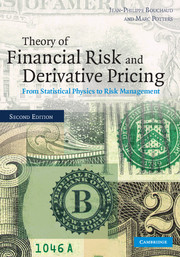Book contents
- Frontmatter
- Contents
- Foreword
- Preface
- 1 Probability theory: basic notions
- 2 Maximum and addition of random variables
- 3 Continuous time limit, Ito calculus and path integrals
- 4 Analysis of empirical data
- 5 Financial products and financial markets
- 6 Statistics of real prices: basic results
- 7 Non-linear correlations and volatility fluctuations
- 8 Skewness and price-volatility correlations
- 9 Cross-correlations
- 10 Risk measures
- 11 Extreme correlations and variety
- 12 Optimal portfolios
- 13 Futures and options: fundamental concepts
- 14 Options: hedging and residual risk
- 15 Options: the role of drift and correlations
- 16 Options: the Black and Scholes model
- 17 Options: some more specific problems
- 18 Options: minimum variance Monte–Carlo
- 19 The yield curve
- 20 Simple mechanisms for anomalous price statistics
- Index of most important symbols
- Index
20 - Simple mechanisms for anomalous price statistics
Published online by Cambridge University Press: 06 July 2010
- Frontmatter
- Contents
- Foreword
- Preface
- 1 Probability theory: basic notions
- 2 Maximum and addition of random variables
- 3 Continuous time limit, Ito calculus and path integrals
- 4 Analysis of empirical data
- 5 Financial products and financial markets
- 6 Statistics of real prices: basic results
- 7 Non-linear correlations and volatility fluctuations
- 8 Skewness and price-volatility correlations
- 9 Cross-correlations
- 10 Risk measures
- 11 Extreme correlations and variety
- 12 Optimal portfolios
- 13 Futures and options: fundamental concepts
- 14 Options: hedging and residual risk
- 15 Options: the role of drift and correlations
- 16 Options: the Black and Scholes model
- 17 Options: some more specific problems
- 18 Options: minimum variance Monte–Carlo
- 19 The yield curve
- 20 Simple mechanisms for anomalous price statistics
- Index of most important symbols
- Index
Summary
In the future, all models will be right, but each one only for 15 minutes.
(E. Derman, after Andy Warhol, Quantitative Finance (2001).)Introduction
Physicists like using power-laws to fit data. The reason for this is that complex, collective phenomenon often give rise to power-laws which are furthermore universal, that is to a large degree independent of the microscopic details of the phenomenon. These power-laws emerge from collective action and transcend individual specificities. As such, they are unforgeable signatures of a collective mechanism. Examples in the physics literature are numerous. A well-known example is that of phase transitions, where a system evolves from a disordered state to an ordered state: many observables behave as universal power laws in the vicinity of the transition point (see e.g. Goldenfeld (1992)). This is related to an important property of power-laws, namely ‘scale invariance’: the characteristic length scale of a physical system at its critical point is infinite, leading to self-similar, scale-free fluctuations. Similarly, power-law distributions are scale invariant in the sense that the relative probability to observe an event of a given size s0 and an event ten times larger is independent of the reference scale s0. Another interesting example is fluid turbulence, where the statistics of the velocity field has scale invariant properties, to a large extent independent of the geometry, the nature of the fluid, of the power injected, etc. (see Frisch (1997)).
Information
- Type
- Chapter
- Information
- Theory of Financial Risk and Derivative PricingFrom Statistical Physics to Risk Management, pp. 355 - 371Publisher: Cambridge University PressPrint publication year: 2003
